The Crime Prevention and Restorative Justice(CPRJ) Coordination Branch was one of the Justice Administration branches in the Department of Justice and Attorney General(DJAG) since June 2012. The branch was established when the former Community Justice Liaison Unit, a project of the Papua New Guinea Law and Justice-Australian Partnership established in 2004 came to an end in 2012. This approach was taken on as part of DJAG’s community obligation to deliver the Justice Administration Services to the communities through the Crime Prevention and Restorative Justice programs and activities.
The Branch was responsible for implementing programs under the five different functions of Crime Prevention, Restorative Justice, Community Engagement, Community Justice Service Centers and Monitoring & Reporting with the Administrative Support Services as well as working in collaboration and partnership with the stakeholders to deliver crime prevention and restorative justice services delivery to the people.
CPRJ Coordination Branch was elevated to a new Branch is 2019 and the Restorative Justice program was internally transferred to Probation Service under Community Based Corrections. The branch now is called Crime Prevention Branch (CPB) and the new division is National, Provincial Coordination and Crime Prevention Division (NPCCP).
CPB has three core program areas and M&R & administrative support sections.
- Crime Prevention Program
- Community Engagement Program
- Community Justice Services Program
- Monitoring and Reporting Section
- Administration Support Section
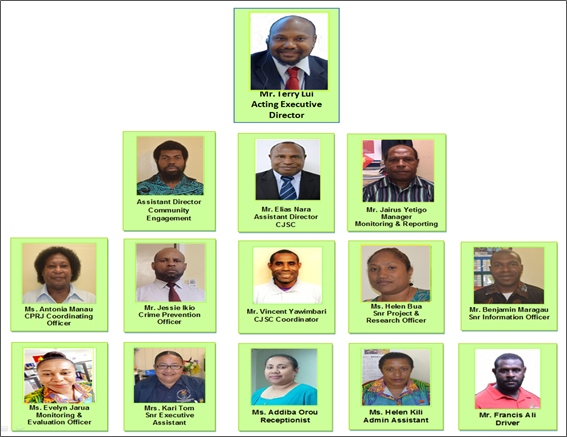
Background
Crime Prevention branch has an Executive Director, 3 Assistant Directors and a Manager for the 4 section managers with their respective officers. The administrative support team ensures the flow of implementing the crime prevention programs and activities.
The branch is mandated to coordinate the crime prevention programs in partnership with the stakeholder partners. It is also mandated under the National Law and Justice Policy & Plan of Action Toward Restorative Justice and the White Paper on the delivery of crime prevention services.
The branch’s responsibilities are to strengthen crime prevention intervention initiatives, consultations with Provincial Governments for possible crime prevention initiatives, contribute to review of existing relevant Legislations and Policies, coordinate Diploma in Justice Administration program, strengthen information dissemination, advocacy and communication with all stakeholders, operationalize the CJSC program for completed CJSC buildings to achieve our goal and objectives.
The strategic priority of the crime prevention captured in the DJAG Corporate Plan 2019-2023 is “A Revitalized Crime Prevention System”. More detailed information can be accessed on pages 16-19 in the Corporate Plan.
Vision
Accepted and trusted facilitator for Civil Society engagement with law and justice sector in Crime Prevention for a just, safe, and peaceful society.
Mission
Support and build capacity in Civil Society and Law and Justice Sector to work together and revitalize Crime Prevention System to deliver quality, reliable, timely and accessible justice services to the people of Papua New Guinea.
Key Result Area
KRA 2: Crime Prevention in the DJAG Corporate Plan 2019-2023.
Goal
Accepted and trusted facilitator for Civil Society engagement with law and justice sector in Crime Prevention for a just, safe, and peaceful society.
Objective
Support and build capacity in Civil Society and Law and Justice Sector to work together and revitalize Crime Prevention System to deliver quality, reliable, timely and accessible justice services to the people of Papua New Guinea.
Policies and Legislations

CPB does not have its own policy and legislation to implement like the other Justice Administration Branches. Therefore, the policy and legislation documentations are amongst the plans and these are progressive as information becomes available after successful outcome of activities like the National Law and Order Summit, CJSCs & Chicken (Poultry) Projects. Apart from these, the branch also takes part in coordinating the implementation of The Law and Justice Policy and Plan of action toward Restorative Justice which is implemented by the Law and Justice Sector Agencies and the relevant NGOs and FBOs.
CPB has now developed a National Crime Prevention Policy which is still in draft. The programs that the branch implements are Crime Prevention, Community Engagement & Community Justice Service Centers and need to have a policy to drive all the programs/projects and eventually having a National Crime Prevention Act and this is why this policy is being progressed for completion as soon as possible.
FUNCTIONS AND RESPONSIBILITIES
The main function of this branch is to provide better improved and effective coordination for crime prevention programs and activities across both government agencies and community based organizations, Faith Based Organizations FBOs) and Non-Government Organizations(NGOs) so that we build strong and better community with functioning community network to reduce or prevent crime in our communities. This work is coordinated through the Crime Prevention partners and Restorative Justice Service Providers Directory which the branch publishes biennially.
CPB Core Functions/Priority Action Areas:
- Strengthening of Crime Prevention intervention initiatives
- Networking and consultations with Provincial Governments, external trainers/ advocators and other Law and Justice service providers to expand crime prevention initiatives
- Contribute to Legislations and Policies developments including the review of existing ones
- Coordinate the Diploma of Justice Administration program and related education/ training programs
- Strengthen information dissemination, advocacy and communication with all stakeholders
- Implementation of NEC Decision 16/2016 to establish CJSCs throughout the country and operationalizing the CJSC program for established Provincial/ District CJSC buildings and coordinate the implementation of crime prevention programs
- Initiate and arrange partnerships between government and non government organizations and also to establish and maintain good partnerships.
- Strengthen logistics and general office administration
Crime Prevention
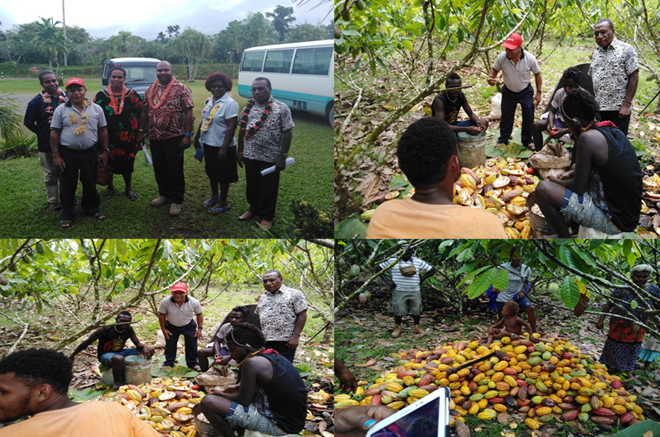
The Crime Prevention Section is responsible for the coordination and monitoring of government and NGOs engaged in providing crime prevention programs. The program focuses on diversifying the crime prevention intervention program particularly targeting the youths. It focuses on the prevention aspects of crime in the country through partnership with relevant Government Organization, NGOs, FBOs, Civil Society Organizations(CSOs) and Corporate Agencies. This program intervene crimes before they arise in the communities by involving the stakeholders and through crime prevention intervention initiatives. Therefore, this has introduced and strategized on some innovative ideas and initiated possible crime prevention interventions. The intervention initiative being rolled out now is in relation to agricultural produce which include cocoa farming, Chicken (Poultry) Project established in various parts of the country targeting youths in the crime hotspot areas. The provinces include NCD, Central, East Sepik, West Sepik, Madang, Morobe, Jiwaka, Western Highlands, Enga and East New Britain.
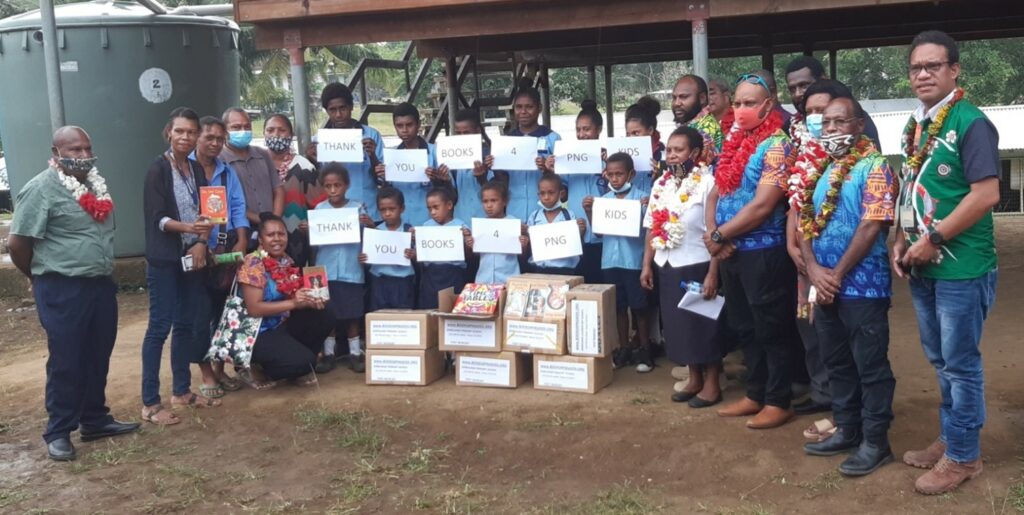
The other crime prevention activities and projects include Youth Outreach, Life Skills Training, Safe School Initiative, awareness on vital issues such as gender equality and child abuse etc. The crime prevention program works in partnership with the private sector to see that services, programs and project are delivered to the communities. Agencies engaged in delivering the services involve are mostly the NGOs, FBOs and Business Houses.
Community Engagement
The Community engagement program was initiated to formally engage with the communities, stakeholders, service providers, Corporate Agencies, Business Houses and solicit funding for all crime prevention programs/projects. This was done through liaison, consultation and collaboration with them in mobilising resources to be shared through partnership arrangements to some of the activities implementation. This engagement approach made some achievements when actual actions were taken to work together in delivering services to the people.
This section is tasked to initiate and arrange partnerships between Government and NGOs and also to establish and maintain program of small grants to support NGOs. The community engagement program connects all relevant stakeholders who are involved in the work of Crime Prevention. To really make this work, some processes have to be followed to leverage Government and NGOs work together in partnership.
There are five different levels that have been engaged with stakeholders in this process. These different levels involved are Inform, Consult, Involve, Collaborate and Empower.
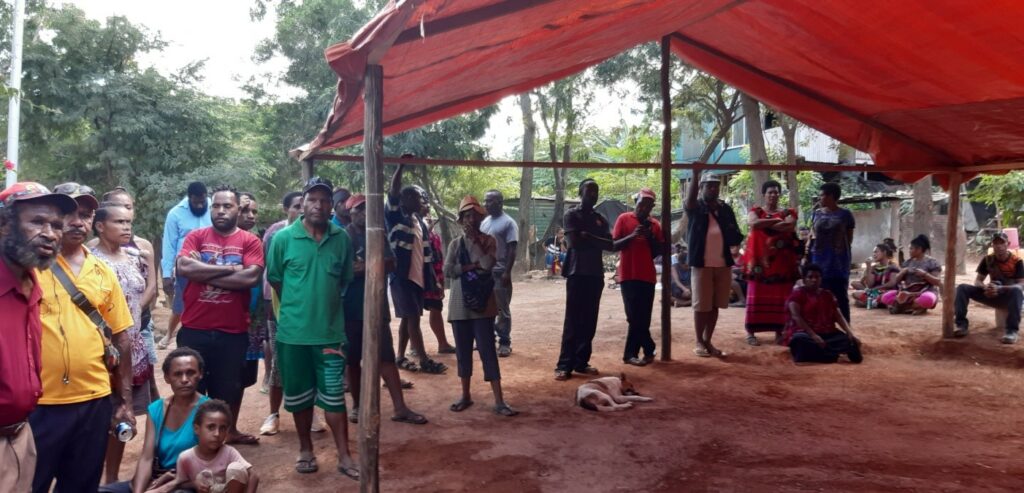
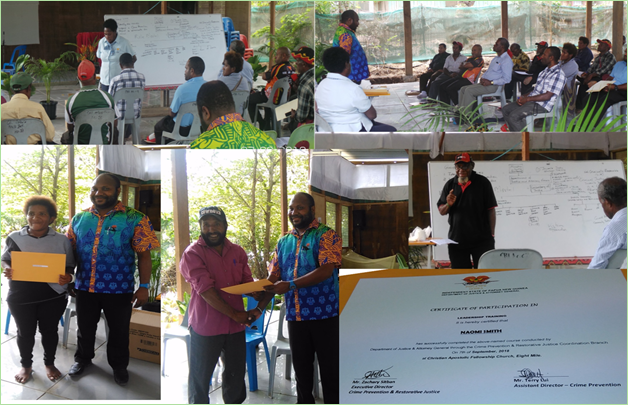
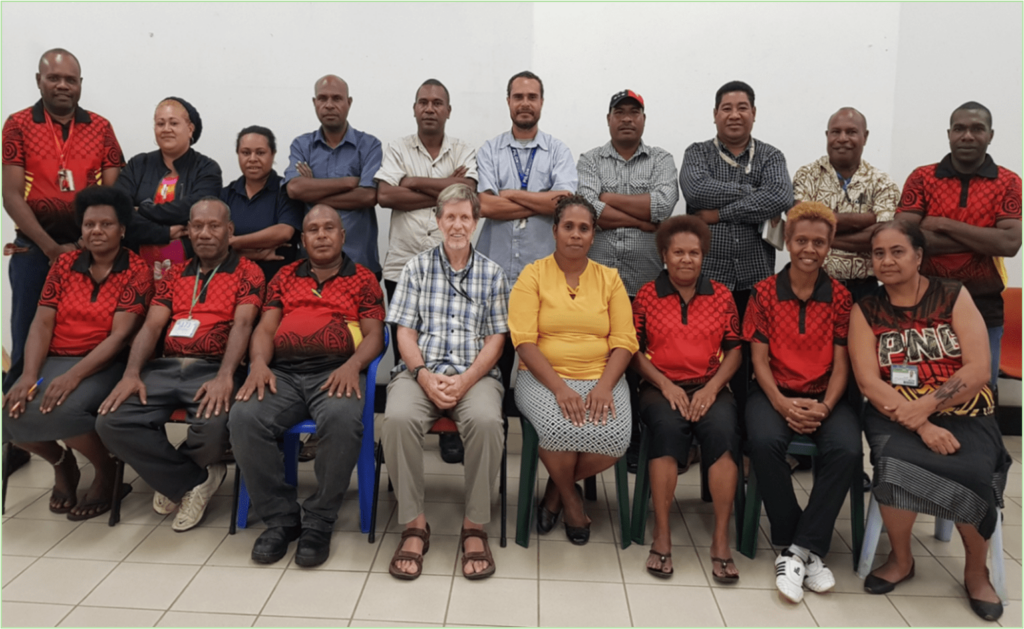
Community Engagement also coordinates the Diploma in Justice Administration program run at the Divine Word University in Madang, Madang Province. The program is for 2 years and students are selected from the Law and Justice Sector agencies. So far, the program has successfully graduated 36 students.
Community Justice Service Centers
The Community Justice Service Center section is responsible for all the Community Justice Service Centers in the districts throughout the country, implementing the NEC decision no. 161/2016 to build Community Justice Services in the districts throughout PNG. The CJSC will act as central coordination center whereby all Law and Justice Sector services are well coordinated and delivered with collection of all data for future planning purposes.

The intention of the CJSC was to ensure that appropriate infrastructure is established in all the districts in the country with qualified staff to assist in delivering law & justice programs at the district and LLG level.
CJSC is a law and justice service delivery center to service the communities in the districts. It is a center where all the services of the Law and Justice sector can be accessed by the targeted community.
The primary law and Justice Sector agencies that can use the facility to provide their services include:
- Department of Justice and Attorney General
- Royal PNG Constabulary
- PNG Correctional services
- PNG Magisterial services
- PNG Ombudsman Commission
- National Narcotics Bureau
- Community Based Corrections
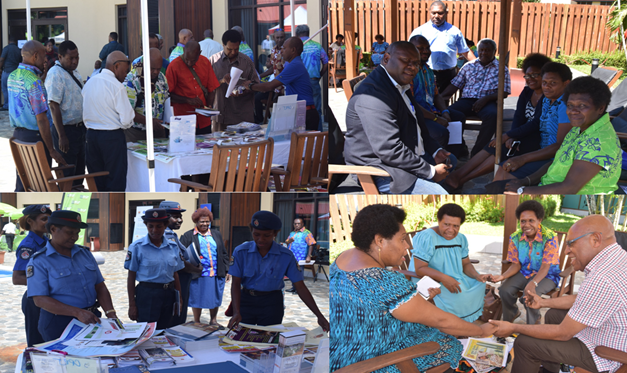
The objective of the CJSC program is to centralize, coordinate & monitor works of law & justice sector stakeholders that deal with crime prevention, restorative justice, rehabilitation programs etc. This is tubing a range of Law & Justice Sector agencies together with other government service providers, NGOs and FBOs providing legal and referral services at the District level.
The different types of service provided by CJSC are:
- Hearing of village court cases
- Mediating land disputes
- Promoting restorative justice process
- Promoting crime prevention initiatives
- Basic legal Aid services
- Witness Support services
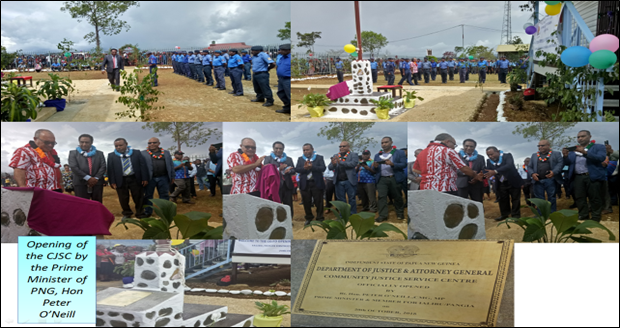
Monitoring and Reporting
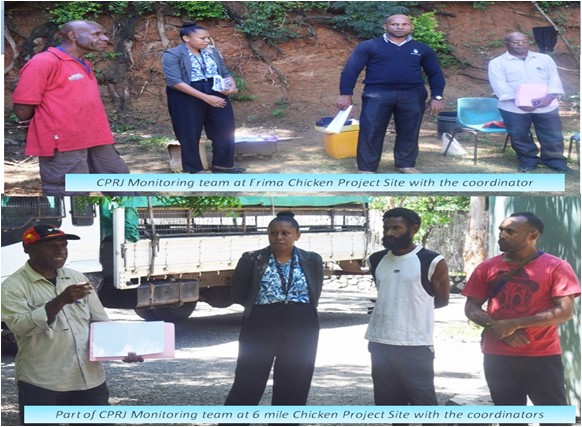
The Monitoring and Reporting section was tasked to establish and maintain an accurate and central database information system for the branch and all the Crime Prevention service providers. Its main focus is on monitoring and reporting covering all the 3 core programs of the branch in coordinating the information management through collating data & information systematically, processing and disseminating by using the current Information Technology through various modes and venues that are available. The main responsibilities are to monitor and track the implementation and outputs of projects and activities of the 3 core programs (CP, CJSC and CE) and do reports (monthly, quarterly, annually); the other responsibility is to establish a crime data storage management system for the branch; the last is to manage the branch information system, eg: brochures, reports, newsletters, posters, etc.
HIGHLIGHTS OF ACHIEVEMENTS
The branch was established in 2012 and the first couple of years were spent in establishing the office. Some of the achievements commenced in 2016 when the chicken project was initiated and when NEC decision number 161/2016 was made and up to the current, many things have been developed, planned, implemented and achieved.
Some of the achievements include the following:
- Initiation and establishment of crime prevention chicken projects;
- NEC Decision 161/2016 to establish CJSCs in all the districts throughout PNG;
- Engagement, network and partnership establishment with program, project and development partners;
- Establishment of 14 CJSCs in the districts;
- Coordination of Diploma in Justice Administration program taught at Divine Word University in Madang;
- Hosting of the first ever National Law and Order Summit in 2018;
- Elevation of CPRJ Branch to a new division of DJAG;
- Formulation of National Crime Prevention Policy;
- Publication of CPRJ service providers directory;
- Publication of Annual Reports; and
- Establishment of partnership with Kairak (UNRE) Agriculture Integrated Training Program.
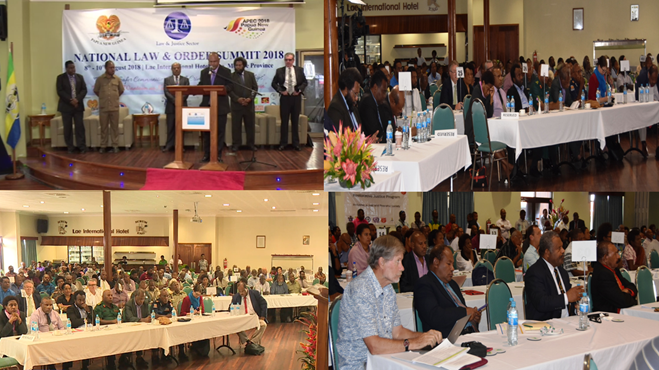
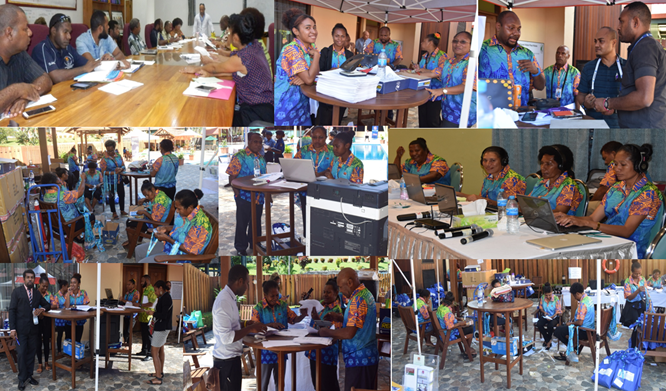
WAY FORWORD
The CPB has come this far with some of the achievements highlighted above including the new division of National Crime Prevention Policy and it is now time for the branch to concentrate on what is ahead which is working under the new division and coordinate the implementation of the programs/project under the new National Crime Prevention Policy and plans.
Following are some of the expected outcomes of the branch in the years going forward:
- To increase support in crime prevention programs or activities at the community level;
- To enhanced cooperation and collaboration on external options in Crime Prevention programs with the Department’s own stakeholders particularly those in the Law & justice Sector. Other organizations including NGOs, stakeholder organizations, CSOs, the business community, land owners, international organizations, donor contractors and the public as required;
- Enhanced cooperation and collaboration in external fight in crime prevention programs with those in the Law and justice Sector and other stakeholders such as Probation Officers, Peace Officers, Police, Correctional Services, Courts, FBOs;
- Increase CSOs working on community governance and community focused on Crime Prevention Programs;
- Initiate and establish new crime prevention projects;
- Continued implementation of the NEC Decision No. 161/2016 to establish CJSCs in all the districts throughout PNG;
- Build and widen the network and partnership establishments with development partners, strengthen new and existing programs/projects;
- Coordination of CJSC program implementations in the districts throughout PNG;
- Continued coordination of Diploma in Justice Administration program taught at Divine Word(DWU) University in Madang, Madang Province;
- Coordinate the implementation of the National Law and Order Summit Outcome Report 2018;
- Coordinate the implementation of the National Crime Prevention Policy 2022-230;
- Continued publication of CPRJ service providers directory published biennially;
- Continued publication of Annual Reports; and
Continued partnership with Kairak (UNRE) Agriculture Integrated Training Program.
Note: More information about CPB and programs can be accessed and read through the branch’s other products and publications which include Annual Reports, Ripples Newsletters, brochures, posters, etc. and also the DJAG Corporate Plans, publications and reports. Information here will be updated when the latest information become available.
